穷爸爸富爸爸
富爸爸穷爸爸的读书笔记(9篇范例)
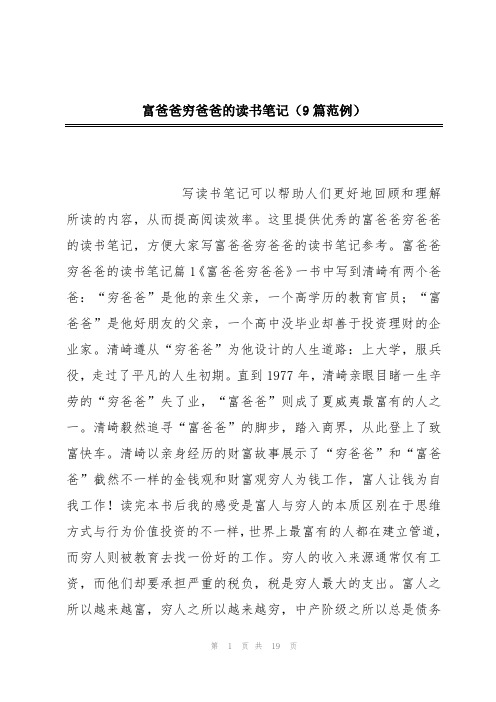
富爸爸穷爸爸的读书笔记(9篇范例)写读书笔记可以帮助人们更好地回顾和理解所读的内容,从而提高阅读效率。
这里提供优秀的富爸爸穷爸爸的读书笔记,方便大家写富爸爸穷爸爸的读书笔记参考。
富爸爸穷爸爸的读书笔记篇1《富爸爸穷爸爸》一书中写到清崎有两个爸爸:“穷爸爸”是他的亲生父亲,一个高学历的教育官员;“富爸爸”是他好朋友的父亲,一个高中没毕业却善于投资理财的企业家。
清崎遵从“穷爸爸”为他设计的人生道路:上大学,服兵役,走过了平凡的人生初期。
直到1977年,清崎亲眼目睹一生辛劳的“穷爸爸”失了业,“富爸爸”则成了夏威夷最富有的人之一。
清崎毅然追寻“富爸爸”的脚步,踏入商界,从此登上了致富快车。
清崎以亲身经历的财富故事展示了“穷爸爸”和“富爸爸”截然不一样的金钱观和财富观穷人为钱工作,富人让钱为自我工作!读完本书后我的感受是富人与穷人的本质区别在于思维方式与行为价值投资的不一样,世界上最富有的人都在建立管道,而穷人则被教育去找一份好的工作。
穷人的收入来源通常仅有工资,而他们却要承担严重的税负,税是穷人最大的支出。
富人之所以越来越富,穷人之所以越来越穷,中产阶级之所以总是债务的泥潭中挣扎,其中一个主要原因就是,他们对金钱的认识不是来自学校,而是来自家庭。
学校的教育只专注于学术知识的传授和专业技能的培养,却忽视了理财技能的培训。
人出于恐惧心理而找一份安稳的工作。
害怕付不起账单,害怕被解雇,害怕没有足够的钱,害怕重新开始,为了寻求保障,他们会学习某种专业,或是做生意,拼命为钱而工作。
大多数人成了钱的奴隶,然后就把怒气发泄在他们老板身上。
大多数人都期望有一份工资收入,因为他们都有恐惧和贪婪之心。
一开始,没钱的恐惧会促使他们努力工作,得到报酬后,贪婪或欲望又让他们想拥有所有钱能买到的好东西。
作为一个自我有房子的雇员,努力工作的结果如下:1。
为别人工作。
就像为工资而工作的大多数人一样,他的工作只会使雇主或股东更加富有,他的努力和成功将使雇主更加成功并得以提早退休。
《富爸爸、穷爸爸》读书心得体会

《富爸爸、穷爸爸》读书心得体会《富爸爸、穷爸爸》讲述了清崎有两个爸爸:穷爸爸是他的亲生父亲,一个高学历的教育官员;富爸爸是他好朋友的父亲,一个高中没毕业却善于投资理财的,清崎以亲身经历的财富故事展示了穷爸爸和富爸爸截然不同的金钱观和财富观。
我准备了以下内容《富爸爸、穷爸爸》读书心得体会,供大家参考!《富爸爸、穷爸爸》读书心得体会我想从以下几个方面来说说我的感受!教育方面:世界每天都在变化,人类的思想方式、生活方式等等都在变化,而我们的教育界一直固守着原方式不变,一直是许多的孩子盲目的接受,听从于家长,学校的各种建议。
你要知道的是:每个人都是一个个体,你就是你自己,学来的知识要变成自己的东西。
而不是强迫别人甚至是自己孩子来接受自己的观点。
如果你得到批评,就用积极的行为告诉人们,你是一个听话的孩子,你是一名与其他孩子是一样的,不是孤立的,不是不同的。
如果这样的话,你放弃的就是一个真实的自己!学校的教育跟不上时代的潮流,家长的思想就多方面的影响孩子的思想,就是以上这两种观点,造成很多的平常人!家庭方面:家长在做,孩子在看。
你的观点、意见、行动无不影响下一代孩子的思维、路程。
世界的对与错、美与丑、善与都是孩子从你那里得到的,而不是他自己的。
对于一个合格的父母,千万不要盲从于父辈遗留下来的教育方式去教育自己的下一代,不要祖祖辈辈遗传的思想,禁锢在下一代身上。
要随时跟上时代的潮流,或者是你与你的孩子一同生长,对与错只要是孩子自己的思想,不要禁锢,只能是建议!孩子不需要太听话,只需要培养出他们自己的意见。
要主观的帮助孩子,用事实证明什么是错,什么是对。
不要光嘴上说,最主要的是用实际行动去说明,而非暴力!社会方面:一成不变的社会不存在!千变万化的社会并非没有,要适应社会,首先要树立自信,自强的思想意识,并用到实际中去。
生活方面:生活并非一成不变,一成不变的只是你思想的懒惰性,抛弃原有的惰性,一成不变的往前看,向前走。
罗伯特清崎《富爸爸,穷爸爸》评析
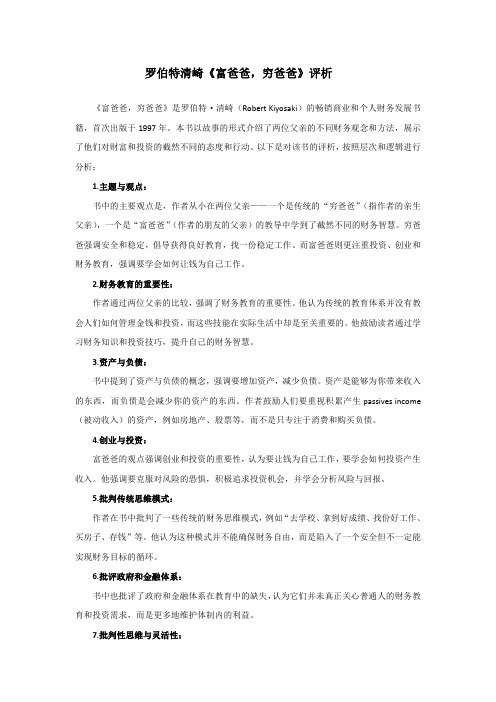
罗伯特清崎《富爸爸,穷爸爸》评析《富爸爸,穷爸爸》是罗伯特·清崎(Robert Kiyosaki)的畅销商业和个人财务发展书籍,首次出版于1997年。
本书以故事的形式介绍了两位父亲的不同财务观念和方法,展示了他们对财富和投资的截然不同的态度和行动。
以下是对该书的评析,按照层次和逻辑进行分析:1.主题与观点:书中的主要观点是,作者从小在两位父亲——一个是传统的“穷爸爸”(指作者的亲生父亲),一个是“富爸爸”(作者的朋友的父亲)的教导中学到了截然不同的财务智慧。
穷爸爸强调安全和稳定,倡导获得良好教育,找一份稳定工作。
而富爸爸则更注重投资、创业和财务教育,强调要学会如何让钱为自己工作。
2.财务教育的重要性:作者通过两位父亲的比较,强调了财务教育的重要性。
他认为传统的教育体系并没有教会人们如何管理金钱和投资,而这些技能在实际生活中却是至关重要的。
他鼓励读者通过学习财务知识和投资技巧,提升自己的财务智慧。
3.资产与负债:书中提到了资产与负债的概念,强调要增加资产,减少负债。
资产是能够为你带来收入的东西,而负债是会减少你的资产的东西。
作者鼓励人们要重视积累产生passives income (被动收入)的资产,例如房地产、股票等,而不是只专注于消费和购买负债。
4.创业与投资:富爸爸的观点强调创业和投资的重要性,认为要让钱为自己工作,要学会如何投资产生收入。
他强调要克服对风险的恐惧,积极追求投资机会,并学会分析风险与回报。
5.批判传统思维模式:作者在书中批判了一些传统的财务思维模式,例如“去学校、拿到好成绩、找份好工作、买房子、存钱”等。
他认为这种模式并不能确保财务自由,而是陷入了一个安全但不一定能实现财务目标的循环。
6.批评政府和金融体系:书中也批评了政府和金融体系在教育中的缺失,认为它们并未真正关心普通人的财务教育和投资需求,而是更多地维护体制内的利益。
7.批判性思维与灵活性:作者强调要培养批判性思维和灵活性,不要被常规观念束缚,要敢于挑战传统。
穷爸爸和富爸爸观后感
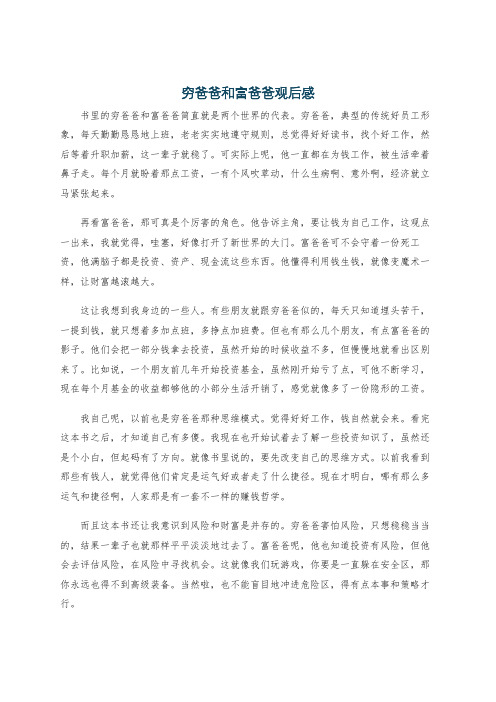
穷爸爸和富爸爸观后感书里的穷爸爸和富爸爸简直就是两个世界的代表。
穷爸爸,典型的传统好员工形象,每天勤勤恳恳地上班,老老实实地遵守规则,总觉得好好读书,找个好工作,然后等着升职加薪,这一辈子就稳了。
可实际上呢,他一直都在为钱工作,被生活牵着鼻子走。
每个月就盼着那点工资,一有个风吹草动,什么生病啊、意外啊,经济就立马紧张起来。
再看富爸爸,那可真是个厉害的角色。
他告诉主角,要让钱为自己工作,这观点一出来,我就觉得,哇塞,好像打开了新世界的大门。
富爸爸可不会守着一份死工资,他满脑子都是投资、资产、现金流这些东西。
他懂得利用钱生钱,就像变魔术一样,让财富越滚越大。
这让我想到我身边的一些人。
有些朋友就跟穷爸爸似的,每天只知道埋头苦干,一提到钱,就只想着多加点班,多挣点加班费。
但也有那么几个朋友,有点富爸爸的影子。
他们会把一部分钱拿去投资,虽然开始的时候收益不多,但慢慢地就看出区别来了。
比如说,一个朋友前几年开始投资基金,虽然刚开始亏了点,可他不断学习,现在每个月基金的收益都够他的小部分生活开销了,感觉就像多了一份隐形的工资。
我自己呢,以前也是穷爸爸那种思维模式。
觉得好好工作,钱自然就会来。
看完这本书之后,才知道自己有多傻。
我现在也开始试着去了解一些投资知识了,虽然还是个小白,但起码有了方向。
就像书里说的,要先改变自己的思维方式。
以前我看到那些有钱人,就觉得他们肯定是运气好或者走了什么捷径。
现在才明白,哪有那么多运气和捷径啊,人家那是有一套不一样的赚钱哲学。
而且这本书还让我意识到风险和财富是并存的。
穷爸爸害怕风险,只想稳稳当当的,结果一辈子也就那样平平淡淡地过去了。
富爸爸呢,他也知道投资有风险,但他会去评估风险,在风险中寻找机会。
这就像我们玩游戏,你要是一直躲在安全区,那你永远也得不到高级装备。
当然啦,也不能盲目地冲进危险区,得有点本事和策略才行。
《富爸爸、穷爸爸》读书心得体会500字(精选3篇)

《富爸爸、穷爸爸》读书心得体会500字(精选3篇)《富爸爸、穷爸爸》读书心得体会500字篇1《富爸爸穷爸爸》是一本理财书籍,我开始认为此书是以非常死板的写法写的,但当我静下心来读了10分钟后,发现书中却是以作者的亲身经历为例子,慢慢地、细心地让我们理解富爸爸的成功理念:穷人为钱工作,富人让钱为自己工作。
在我细细口味书中故事时,我也悄然打开了一扇全新财商认知之门,它告诉了我在社会当中的两类人:一种人是有学历有知识,但只会按部就班的完成着既定的工作,和穷爸爸一样;另一种人是会通过创新与探索去寻找一份成功,很好的平衡好自己的工作与生活,他们懂得把钱用来投资,让钱生钱,也就是让钱为他工作,跟富爸爸一样。
当我把这本书中所学的知识运用到生活中去,忽然发现,我貌似也登上了致富快车。
总之,《富爸爸穷爸爸》告诉了我宝贵的财商知识,告诉了我以后工作学习时要抓住良好的机会为成功铺路,并三思而后行,还要敢于冒险,拥有坚强的人格,勇敢的心。
在此我也很乐意将这书推荐给大家,也希望你们也能从这书中读到属于你的学习致富理念。
虽然明白富贵险中求的道理却从不曾越线。
可以说今后依然会会考虑分散风险但也会平静地接受收获减低的事实。
《富爸爸、穷爸爸》读书心得体会500字篇2穷爸爸富爸爸这本书早在二年前我就看过,对我的启发非常大,如果二年前我没有看这本书想必我今天还在打工,最近我又重新看了这本书嘿嘿,没想到又应验了老话——书中自有黄金屋书中自有颜如玉啊。
我比较认真的看了富人不为钱工作这一章节。
标题吸引了我,在我的认知范围内,富人都是为钱工作的。
不过又仔细想想世界五百强们应该就不是为钱工作了吧,恩,只能说我认识的富人还不能介定为真正意义上的富人了。
一章读完证明确实如此。
原来认为的开着大公司开好车有好几套房子的富人们,他们一样因为恐惧和贪婪为钱而工作,身心都不能自由和快乐。
因为可能他们不知道关于钱的知识;不知道什么是资产和负债;(资产就是能把钱放进你口袋里的东西,负债是把钱从你口袋里取走的东西)而只是害怕没有钱的生活,让这种害怕的情绪控制了他们的思想和行为,象一头驴一样的周而复始的老鼠赛跑。
《富爸爸穷爸爸》读书笔记
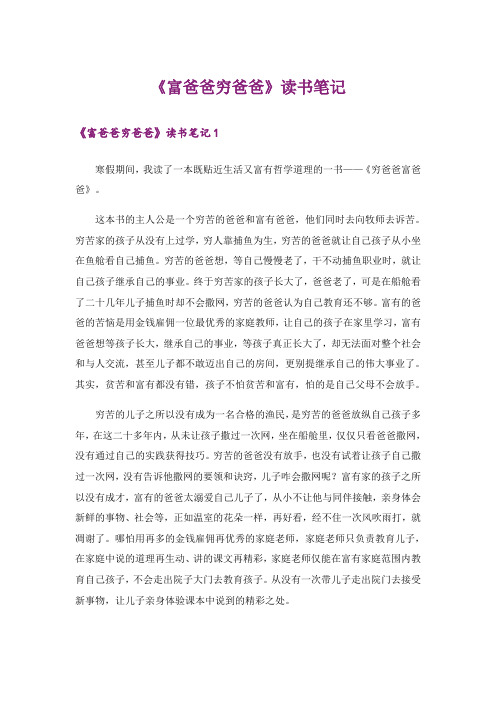
《富爸爸穷爸爸》读书笔记《富爸爸穷爸爸》读书笔记1寒假期间,我读了一本既贴近生活又富有哲学道理的一书——《穷爸爸富爸爸》。
这本书的主人公是一个穷苦的爸爸和富有爸爸,他们同时去向牧师去诉苦。
穷苦家的孩子从没有上过学,穷人靠捕鱼为生,穷苦的爸爸就让自己孩子从小坐在鱼舱看自己捕鱼。
穷苦的爸爸想,等自己慢慢老了,干不动捕鱼职业时,就让自己孩子继承自己的事业。
终于穷苦家的孩子长大了,爸爸老了,可是在船舱看了二十几年儿子捕鱼时却不会撒网,穷苦的爸爸认为自己教育还不够。
富有的爸爸的苦恼是用金钱雇佣一位最优秀的家庭教师,让自己的孩子在家里学习,富有爸爸想等孩子长大,继承自己的事业,等孩子真正长大了,却无法面对整个社会和与人交流,甚至儿子都不敢迈出自己的房间,更别提继承自己的伟大事业了。
其实,贫苦和富有都没有错,孩子不怕贫苦和富有,怕的是自己父母不会放手。
穷苦的儿子之所以没有成为一名合格的渔民,是穷苦的爸爸放纵自己孩子多年,在这二十多年内,从未让孩子撒过一次网,坐在船舱里,仅仅只看爸爸撒网,没有通过自己的实践获得技巧。
穷苦的爸爸没有放手,也没有试着让孩子自己撒过一次网,没有告诉他撒网的要领和诀窍,儿子咋会撒网呢?富有家的孩子之所以没有成才,富有的爸爸太溺爱自己儿子了,从小不让他与同伴接触,亲身体会新鲜的事物、社会等,正如温室的花朵一样,再好看,经不住一次风吹雨打,就凋谢了。
哪怕用再多的金钱雇佣再优秀的家庭老师,家庭老师只负责教育儿子,在家庭中说的道理再生动、讲的课文再精彩,家庭老师仅能在富有家庭范围内教育自己孩子,不会走出院子大门去教育孩子。
从没有一次带儿子走出院门去接受新事物,让儿子亲身体验课本中说到的精彩之处。
我们这一代都是长辈们“掌上明珠"、“家中的宝贝”,含在嘴里怕化了,捧在手里怕摔了,要什么有什么的时代,生活中处处可见这些溺爱孩子的长辈们,其实放手和正确引导才是对孩子最好的爱,不要以为我们这些孩子只要长辈的溺爱,其实我们是有自己的思想和远大抱负,我们事事需要自己的亲身体会,只有我们经受过风雨才能锻炼我们后期茁壮成长。
穷爸爸富爸爸经典语录及感悟
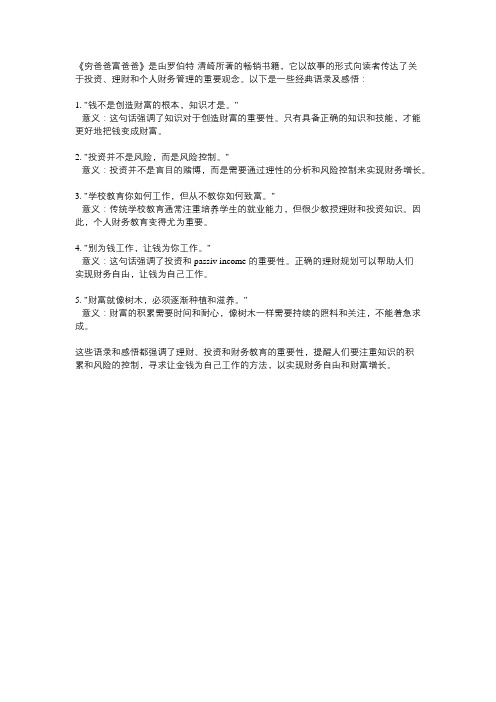
《穷爸爸富爸爸》是由罗伯特·清崎所著的畅销书籍,它以故事的形式向读者传达了关
于投资、理财和个人财务管理的重要观念。
以下是一些经典语录及感悟:
1. "钱不是创造财富的根本,知识才是。
"
意义:这句话强调了知识对于创造财富的重要性。
只有具备正确的知识和技能,才能更好地把钱变成财富。
2. "投资并不是风险,而是风险控制。
"
意义:投资并不是盲目的赌博,而是需要通过理性的分析和风险控制来实现财务增长。
3. "学校教育你如何工作,但从不教你如何致富。
"
意义:传统学校教育通常注重培养学生的就业能力,但很少教授理财和投资知识。
因此,个人财务教育变得尤为重要。
4. "别为钱工作,让钱为你工作。
"
意义:这句话强调了投资和 passiv income 的重要性。
正确的理财规划可以帮助人们
实现财务自由,让钱为自己工作。
5. "财富就像树木,必须逐渐种植和滋养。
"
意义:财富的积累需要时间和耐心,像树木一样需要持续的照料和关注,不能着急求成。
这些语录和感悟都强调了理财、投资和财务教育的重要性,提醒人们要注重知识的积
累和风险的控制,寻求让金钱为自己工作的方法,以实现财务自由和财富增长。
《富爸爸穷爸爸》读后感(精选15篇)
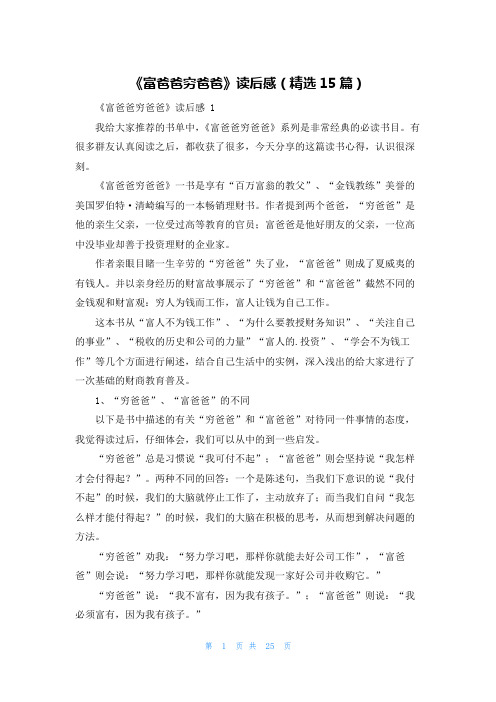
《富爸爸穷爸爸》读后感(精选15篇)《富爸爸穷爸爸》读后感 1我给大家推荐的书单中,《富爸爸穷爸爸》系列是非常经典的必读书目。
有很多群友认真阅读之后,都收获了很多,今天分享的这篇读书心得,认识很深刻。
《富爸爸穷爸爸》一书是享有“百万富翁的教父”、“金钱教练”美誉的美国罗伯特·清崎编写的一本畅销理财书。
作者提到两个爸爸,“穷爸爸”是他的亲生父亲,一位受过高等教育的官员;富爸爸是他好朋友的父亲,一位高中没毕业却善于投资理财的企业家。
作者亲眼目睹一生辛劳的“穷爸爸”失了业,“富爸爸”则成了夏威夷的有钱人。
并以亲身经历的财富故事展示了“穷爸爸”和“富爸爸”截然不同的金钱观和财富观:穷人为钱而工作,富人让钱为自己工作。
这本书从“富人不为钱工作”、“为什么要教授财务知识”、“关注自己的事业”、“税收的历史和公司的力量”“富人的.投资”、“学会不为钱工作”等几个方面进行阐述,结合自己生活中的实例,深入浅出的给大家进行了一次基础的财商教育普及。
1、“穷爸爸”、“富爸爸”的不同以下是书中描述的有关“穷爸爸”和“富爸爸”对待同一件事情的态度,我觉得读过后,仔细体会,我们可以从中的到一些启发。
“穷爸爸”总是习惯说“我可付不起”;“富爸爸”则会坚持说“我怎样才会付得起?”。
两种不同的回答:一个是陈述句,当我们下意识的说“我付不起”的时候,我们的大脑就停止工作了,主动放弃了;而当我们自问“我怎么样才能付得起?”的时候,我们的大脑在积极的思考,从而想到解决问题的方法。
“穷爸爸”劝我:“努力学习吧,那样你就能去好公司工作”,“富爸爸”则会说:“努力学习吧,那样你就能发现一家好公司并收购它。
”“穷爸爸”说:“我不富有,因为我有孩子。
”;“富爸爸”则说:“我必须富有,因为我有孩子。
”“穷爸爸”努力存钱,“富爸爸”不断投资。
“穷爸爸”说:“我永远不会成为富人。
”于是这句话就成了事实;“富爸爸”恰恰相反,他总是会说:“我是一个富人,富人不会这么做。
《穷爸爸富爸爸》读后感

《穷爸爸富爸爸》读后感《穷爸爸富爸爸》读后感(精选5篇)《穷爸爸富爸爸》读后感1寒假期间,我读了一本既贴近生活又富有哲学道理的一书——《穷爸爸富爸爸》。
这本书的主人公是一个穷苦的爸爸和富有爸爸,他们同时去向牧师去诉苦。
穷苦家的孩子从没有上过学,穷人靠捕鱼为生,穷苦的爸爸就让自己孩子从小坐在鱼舱看自己捕鱼。
穷苦的爸爸想,等自己慢慢老了,干不动捕鱼职业时,就让自己孩子继承自己的事业。
终于穷苦家的孩子长大了,爸爸老了,可是在船舱看了二十几年儿子捕鱼时却不会撒网,穷苦的爸爸认为自己教育还不够。
富有的爸爸的苦恼是用金钱雇佣一位最优秀的家庭教师,让自己的孩子在家里学习,富有爸爸想等孩子长大,继承自己的事业,等孩子真正长大了,却无法面对整个社会和与人交流,甚至儿子都不敢迈出自己的房间,更别提继承自己的伟大事业了。
其实,贫苦和富有都没有错,孩子不怕贫苦和富有,怕的是自己父母不会放手。
穷苦的儿子之所以没有成为一名合格的渔民,是穷苦的爸爸放纵自己孩子多年,在这二十多年内,从未让孩子撒过一次网,坐在船舱里,仅仅只看爸爸撒网,没有通过自己的实践获得技巧。
穷苦的爸爸没有放手,也没有试着让孩子自己撒过一次网,没有告诉他撒网的要领和诀窍,儿子咋会撒网呢?富有家的孩子之所以没有成才,富有的爸爸太溺爱自己儿子了,从小不让他与同伴接触,亲身体会新鲜的事物、社会等,正如温室的花朵一样,再好看,经不住一次风吹雨打,就凋谢了。
哪怕用再多的金钱雇佣再优秀的家庭老师,家庭老师只负责教育儿子,在家庭中说的道理再生动、讲的课文再精彩,家庭老师仅能在富有家庭范围内教育自己孩子,不会走出院子大门去教育孩子。
从没有一次带儿子走出院门去接受新事物,让儿子亲身体验课本中说到的精彩之处。
我们这一代都是长辈们“掌上明珠"、“家中的宝贝”,含在嘴里怕化了,捧在手里怕摔了,要什么有什么的时代,生活中处处可见这些溺爱孩子的长辈们,其实放手和正确引导才是对孩子最好的爱,不要以为我们这些孩子只要长辈的溺爱,其实我们是有自己的思想和远大抱负,我们事事需要自己的亲身体会,只有我们经受过风雨才能锻炼我们后期茁一壮成长。
穷爸爸富爸爸读书笔记

穷爸爸富爸爸读书笔记穷爸爸富爸爸读书笔记1寒假期间,我读了一本既贴近生活又富有哲学道理的一书——《穷爸爸富爸爸》。
这本书的主人公是一个穷苦的爸爸和富有爸爸,他们同时去向牧师去诉苦。
穷苦家的孩子从没有上过学,穷人靠捕鱼为生,穷苦的爸爸就让自己孩子从小坐在鱼舱看自己捕鱼。
穷苦的爸爸想,等自己慢慢老了,干不动捕鱼职业时,就让自己孩子继承自己的事业。
终于穷苦家的孩子长大了,爸爸老了,可是在船舱看了二十几年儿子捕鱼时却不会撒网,穷苦的爸爸认为自己教育还不够。
富有的爸爸的苦恼是用金钱雇佣一位最优秀的家庭教师,让自己的孩子在家里学习,富有爸爸想等孩子长大,继承自己的事业,等孩子真正长大了,却无法面对整个社会和与人交流,甚至儿子都不敢迈出自己的房间,更别提继承自己的伟大事业了。
其实,贫苦和富有都没有错,孩子不怕贫苦和富有,怕的是自己父母不会放手。
穷苦的儿子之所以没有成为一名合格的渔民,是穷苦的爸爸放纵自己孩子多年,在这二十多年内,从未让孩子撒过一次网,坐在船舱里,仅仅只看爸爸撒网,没有通过自己的实践获得技巧。
穷苦的爸爸没有放手,也没有试着让孩子自己撒过一次网,没有告诉他撒网的要领和诀窍,儿子咋会撒网呢?富有家的孩子之所以没有成才,富有的爸爸太溺爱自己儿子了,从小不让他与同伴接触,亲身体会新鲜的事物、社会等,正如温室的花朵一样,再好看,经不住一次风吹雨打,就凋谢了。
哪怕用再多的金钱雇佣再优秀的家庭老师,家庭老师只负责教育儿子,在家庭中说的道理再生动、讲的课文再精彩,家庭老师仅能在富有家庭范围内教育自己孩子,不会走出院子大门去教育孩子。
从没有一次带儿子走出院门去接受新事物,让儿子亲身体验课本中说到的精彩之处。
我们这一代都是长辈们“掌上明珠"、“家中的宝贝”,含在嘴里怕化了,捧在手里怕摔了,要什么有什么的时代,生活中处处可见这些溺爱孩子的长辈们,其实放手和正确引导才是对孩子最好的爱,不要以为我们这些孩子只要长辈的溺爱,其实我们是有自己的思想和远大抱负,我们事事需要自己的亲身体会,只有我们经受过风雨才能锻炼我们后期茁壮成长。
《富爸爸穷爸爸》简介

由于我开始金钱这门课的学习时只有9岁,因此富 爸爸只教我一些简单的东西。 当他把所有想教给 我的东西说完做完时, 总共也只有6门主要的课程, 但这些课程 在我的脑海中重复了30多年。 本书下 面的内容就是关于这6门课的介绍,其形式简 单得 就如同当年富爸爸教我时那样。这些课程不是最终 答案而是一个向导,一个在 这个不确定和飞速变 化的世界中帮助你和你的孩子积累财富的向导。 第一课富人不为钱工作第二课为什么要教授财务知 识第三课关注自己的事业第 四课税收的历史和公 司的力量第五课富人的投资第六课不要为金钱而工 作
1985年,他离开商界,与别人共同创建了一家国际教育公 司。这家公司在七个国家设有办事处,向成千上万的学生教授 商业和投资课程。他主持的长达一年的节目通过怀旧有线网在 全美播放,以传播他的教育理论。
罗伯特在47岁时退休,做起他最喜欢的事情——投资。 深感“有产者”与“无产者”之间不断扩大的鸿沟,罗 伯特发明了一种教育玩具——“现金流”纸板游戏,并 用它教会人们去玩那些在以前只有富人们懂得的金钱游 戏。 他曾和沃格·曼了诺、Zig Zglar和安东尼·罗宾 斯等人一道同台演讲。罗伯特·T·清崎要传递的信息 是清楚的。“为你的财务负起责任或一生只听从别人的 命令,你要么是金钱的主人,要么是金钱的奴隶。”罗 伯特举办过长到一周短到一小时的辅导班,教给人们有 关富裕的秘密,他发出了一个强烈的信息,这个信息就 是:你的天赋正等待被开发出来,请唤醒你的理财天赋。
富爸爸则说: “金钱就是力量”。 尽管思想的力量从 不能被测量或评估,但当我还是一个小男孩时,我已经 开始 明确地关注我的思想以及我的自我表述了。我注意 到穷爸爸之所以穷不在于他挣到 的钱的多少(尽管这也 很重要),而在于他的想法和行动。我必须极其小心地 选择 他们两位向我传递的思想并为我所用。唉,我有两 个爸爸,我究竟应该听谁的话: 穷爸爸还是富爸爸? 两个爸爸都很重视教育和学习,但两人对于什么才是重 要的。应该学习些什么 的看法却不一致。一个爸爸希望 我努力学习,获得好成绩,找个挣钱多的好工作, 他希 望我能够成为一名教授。律师或会计师,或者去读MBA. 另一个爸爸则鼓励我学 习挣钱,去了解钱的运动规律并 让这种运动规律为我所用。“我不为钱工作”,这 是他 说了一遍又一遍的话,“钱要为我工作。”
穷爸爸富爸爸中英文对照版
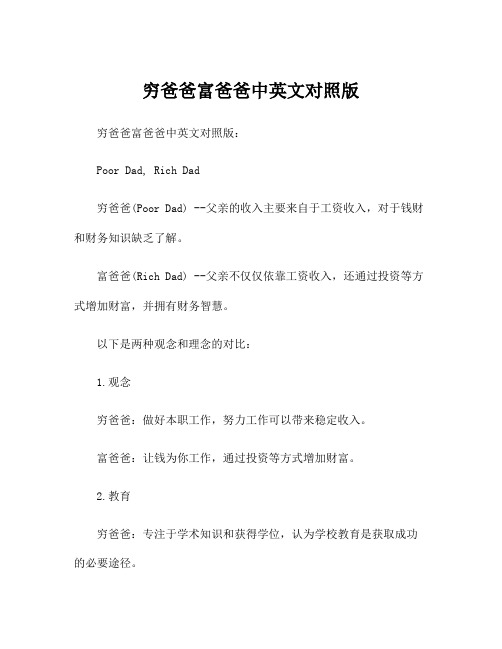
穷爸爸富爸爸中英文对照版穷爸爸富爸爸中英文对照版:
Poor Dad, Rich Dad
穷爸爸(Poor Dad) --父亲的收入主要来自于工资收入,对于钱财和财务知识缺乏了解。
富爸爸(Rich Dad) --父亲不仅仅依靠工资收入,还通过投资等方式增加财富,并拥有财务智慧。
以下是两种观念和理念的对比:
1.观念
穷爸爸:做好本职工作,努力工作可以带来稳定收入。
富爸爸:让钱为你工作,通过投资等方式增加财富。
2.教育
穷爸爸:专注于学术知识和获得学位,认为学校教育是获取成功的必要途径。
富爸爸:注重财务教育,认为学习如何赚钱、理解投资和财务管
理等知识才能获得成功。
3.风险和机会
穷爸爸:避免风险,寻求稳定、安全的工作。
富爸爸:将风险视为机会,敢于冒险,相信投资和创业能够带来
财务自由。
4.负债和资产
穷爸爸:将房贷、车贷等债务视为负担。
富爸爸:通过投资房地产、股票等资产,使得资产带来更多收入。
5.工作和激励
穷爸爸:工作是为了工资,工资唯一的激励。
富爸爸:追求热爱并擅长的工作,享受工作所带来的成就感,并
通过投资等方式增加收入。
6.财务知识
穷爸爸:缺乏财务知识,往往容易成为被金钱支配的人。
富爸爸:注重财务知识的学习和理解,能够掌控金钱,并使金钱
为自己服务。
这些是两个父亲家庭背景和财务观念的对比,希望对你有所帮助。
穷爸爸富爸爸读后感题目
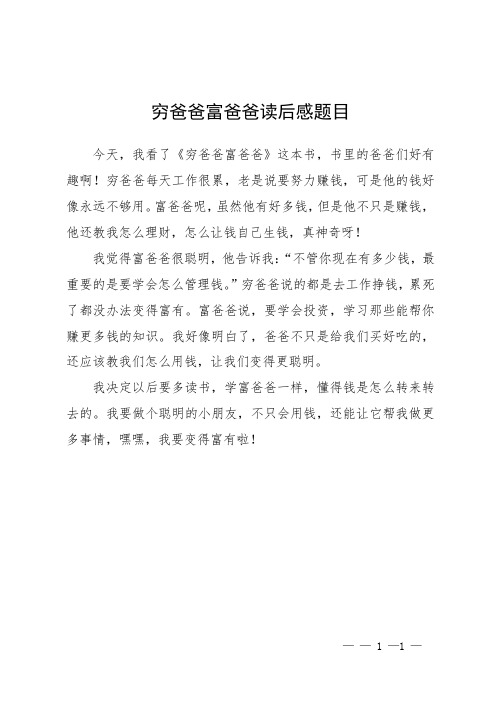
穷爸爸富爸爸读后感题目
今天,我看了《穷爸爸富爸爸》这本书,书里的爸爸们好有趣啊!穷爸爸每天工作很累,老是说要努力赚钱,可是他的钱好像永远不够用。
富爸爸呢,虽然他有好多钱,但是他不只是赚钱,他还教我怎么理财,怎么让钱自己生钱,真神奇呀!
我觉得富爸爸很聪明,他告诉我:“不管你现在有多少钱,最重要的是要学会怎么管理钱。
”穷爸爸说的都是去工作挣钱,累死了都没办法变得富有。
富爸爸说,要学会投资,学习那些能帮你赚更多钱的知识。
我好像明白了,爸爸不只是给我们买好吃的,还应该教我们怎么用钱,让我们变得更聪明。
我决定以后要多读书,学富爸爸一样,懂得钱是怎么转来转去的。
我要做个聪明的小朋友,不只会用钱,还能让它帮我做更多事情,嘿嘿,我要变得富有啦!
—— 1 —1 —。
穷爸爸富爸爸读书笔记(精选10篇)

穷爸爸富爸爸读书笔记穷爸爸富爸爸读书笔记(精选10篇)读完一本书以后,你有什么领悟呢?不能光会读哦,写一篇读书笔记吧。
千万不能认为读书笔记随便应付就可以,以下是小编为大家整理的穷爸爸富爸爸读书笔记(精选10篇),仅供参考,希望能够帮助到大家。
这本书说的是家境贫穷的罗伯特和迈克期望家中有钱而成为当时还没富的富爸爸的学生,经过考验(其中富爸爸富起来了),两人均掌握了所有知识。
富爸爸死后将自我的所有家产传给了迈克,而罗伯特最终也成为了美国著名的作家、教育家、富翁。
这本书的故事极有好处。
当我看到罗伯特和迈克因贫穷而被人瞧不起时,我为他们感到难过;当他们被富爸爸“欺负”时,我十分愤怒;当富爸爸身体力行,未达成承诺而努力时,我十分地感动,当富爸爸为了让罗伯特和迈克尽早学成而简化了课程时,我更加感动了;而当他们最终最后“修成正果”时,我开心极了。
当我得知罗伯特有时用富爸爸的话来解释对钱的概念时,我开始敬佩起了富爸爸;而当我得知罗伯特对穷人、中产阶级、富人三个阶级所绘的图是富爸爸当年所教时,我对富爸爸更是敬仰。
我觉得罗伯特的成功与主人公富爸爸密不可分。
《穷爸爸,富爸爸》这本书虽然是一本关于发财致富的书,但是其中的一些做人道理却不可忽视,我觉得这对我们的身心健康极有好处,而这本书中的理财知识和做人道理在不远的将来将对我们不无裨益。
周末去书店买书,《穷爸爸,富爸爸》的名字一下子映入了我的眼球,于是立刻打开书阅读了起来。
看简介《穷爸爸,富爸爸》是一本关于理财的书籍,当时我很好奇一本理财书籍如何可以用故事的形式来表达呢,不应该是一些关于股票、储蓄、投资的方式与方法的书籍吗,看过之后我便知道,它所传达的信息是非常简单却富于震撼力的。
读完这本书,对我来说颇有感触。
《穷爸爸,富爸爸》是一个真实的故事,从人的个体出发,分析富人之所以成为富人,穷人之所以成为穷人的自身因素。
该书主要是讲两个爸爸——穷爸爸与富爸爸,罗伯特?清崎的爸爸,受过高等教育,有很好的工作,但他却是个穷爸爸,或者只能算个中产阶级。
《富爸爸--穷爸爸》梗概
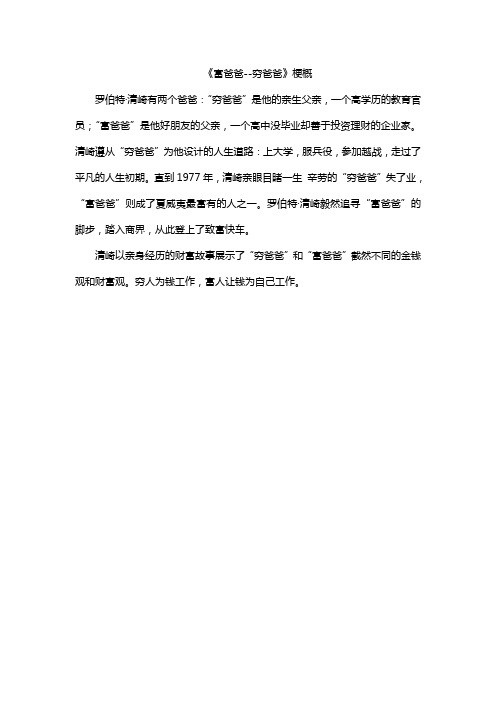
《富爸爸--穷爸爸》梗概
罗伯特·清崎有两个爸爸:“穷爸爸”是他的亲生父亲,一个高学历的教育官员;“富爸爸”是他好朋友的父亲,一个高中没毕业却善于投资理财的企业家。
清崎遵从“穷爸爸”为他设计的人生道路:上大学,服兵役,参加越战,走过了平凡的人生初期。
直到1977年,清崎亲眼目睹一生辛劳的“穷爸爸”失了业,“富爸爸”则成了夏威夷最富有的人之一。
罗伯特·清崎毅然追寻“富爸爸”的脚步,踏入商界,从此登上了致富快车。
清崎以亲身经历的财富故事展示了“穷爸爸”和“富爸爸”截然不同的金钱观和财富观。
穷人为钱工作,富人让钱为自己工作。
穷爸爸富爸爸100句经典语录
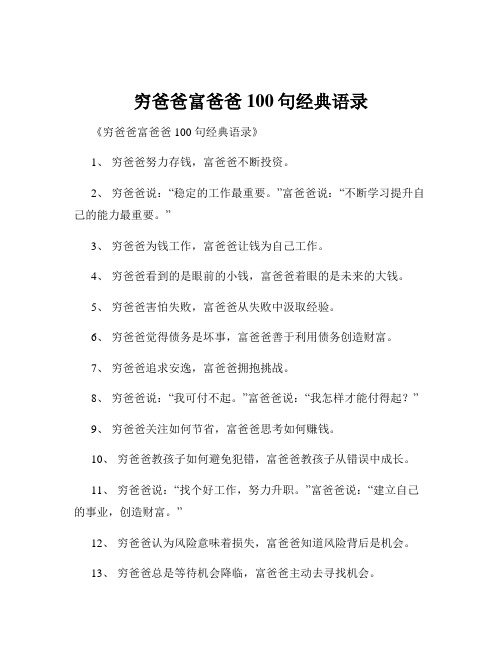
穷爸爸富爸爸100句经典语录《穷爸爸富爸爸 100 句经典语录》1、穷爸爸努力存钱,富爸爸不断投资。
2、穷爸爸说:“稳定的工作最重要。
”富爸爸说:“不断学习提升自己的能力最重要。
”3、穷爸爸为钱工作,富爸爸让钱为自己工作。
4、穷爸爸看到的是眼前的小钱,富爸爸着眼的是未来的大钱。
5、穷爸爸害怕失败,富爸爸从失败中汲取经验。
6、穷爸爸觉得债务是坏事,富爸爸善于利用债务创造财富。
7、穷爸爸追求安逸,富爸爸拥抱挑战。
8、穷爸爸说:“我可付不起。
”富爸爸说:“我怎样才能付得起?”9、穷爸爸关注如何节省,富爸爸思考如何赚钱。
10、穷爸爸教孩子如何避免犯错,富爸爸教孩子从错误中成长。
11、穷爸爸说:“找个好工作,努力升职。
”富爸爸说:“建立自己的事业,创造财富。
”12、穷爸爸认为风险意味着损失,富爸爸知道风险背后是机会。
13、穷爸爸总是等待机会降临,富爸爸主动去寻找机会。
14、穷爸爸抱怨经济不好,富爸爸在不好的经济中寻找商机。
15、穷爸爸把钱花在消费上,富爸爸把钱花在投资自己和资产上。
16、穷爸爸为了钱牺牲健康,富爸爸知道健康才是最大的财富。
17、穷爸爸害怕改变,富爸爸乐于接受改变。
18、穷爸爸说:“这太贵了。
”富爸爸说:“投资自己永远不嫌贵。
”19、穷爸爸依赖政府和公司,富爸爸依靠自己的智慧和能力。
20、穷爸爸认为富人贪婪,富爸爸明白财富是通过创造价值获得的。
21、穷爸爸注重学历,富爸爸注重实践经验。
22、穷爸爸说:“等我有钱了再投资。
”富爸爸说:“现在就开始投资,钱会慢慢多起来。
”23、穷爸爸害怕竞争,富爸爸在竞争中脱颖而出。
24、穷爸爸认为省钱就是理财,富爸爸懂得让钱生钱才是理财。
25、穷爸爸关注工资,富爸爸关注资产和现金流。
26、穷爸爸在问题面前束手无策,富爸爸想办法解决问题。
27、穷爸爸为了面子消费,富爸爸为了价值消费。
28、穷爸爸说:“我没时间学习理财。
”富爸爸说:“挤出时间学习理财,才能改变命运。
穷爸爸富爸爸观后感300字
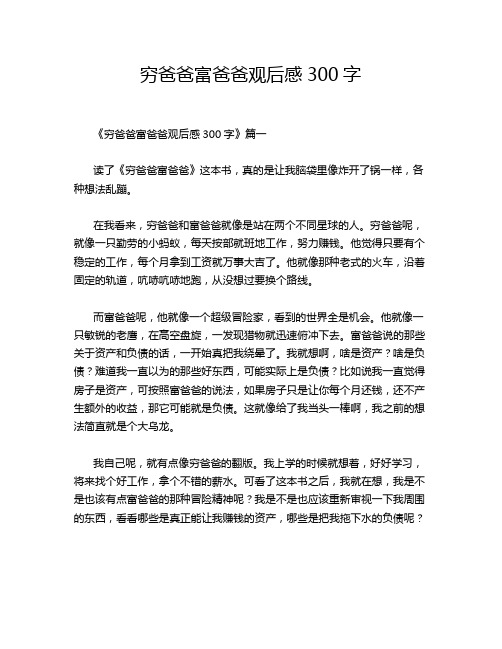
穷爸爸富爸爸观后感300字《穷爸爸富爸爸观后感300字》篇一读了《穷爸爸富爸爸》这本书,真的是让我脑袋里像炸开了锅一样,各种想法乱蹦。
在我看来,穷爸爸和富爸爸就像是站在两个不同星球的人。
穷爸爸呢,就像一只勤劳的小蚂蚁,每天按部就班地工作,努力赚钱。
他觉得只要有个稳定的工作,每个月拿到工资就万事大吉了。
他就像那种老式的火车,沿着固定的轨道,吭哧吭哧地跑,从没想过要换个路线。
而富爸爸呢,他就像一个超级冒险家,看到的世界全是机会。
他就像一只敏锐的老鹰,在高空盘旋,一发现猎物就迅速俯冲下去。
富爸爸说的那些关于资产和负债的话,一开始真把我绕晕了。
我就想啊,啥是资产?啥是负债?难道我一直以为的那些好东西,可能实际上是负债?比如说我一直觉得房子是资产,可按照富爸爸的说法,如果房子只是让你每个月还钱,还不产生额外的收益,那它可能就是负债。
这就像给了我当头一棒啊,我之前的想法简直就是个大乌龙。
我自己呢,就有点像穷爸爸的翻版。
我上学的时候就想着,好好学习,将来找个好工作,拿个不错的薪水。
可看了这本书之后,我就在想,我是不是也该有点富爸爸的那种冒险精神呢?我是不是也应该重新审视一下我周围的东西,看看哪些是真正能让我赚钱的资产,哪些是把我拖下水的负债呢?我觉得这本书就像一把钥匙,它打开了我脑袋里一扇新的门。
以前我看世界就像雾里看花,模模糊糊的,现在感觉有点拨开云雾见青天的意思了。
不过我也在想,富爸爸的那些理念是不是真的适合每个人呢?也许对于有些人来说,稳定就是最大的幸福,冒险反而会让他们睡不着觉。
但不管怎么说,这本书真的让我有了很多新的思考,就像在我平静的湖面上扔了一颗大石头,激起了千层浪。
《穷爸爸富爸爸观后感300字》篇二《穷爸爸富爸爸》这本书读完之后,我心里那叫一个五味杂陈啊。
我先说说这个穷爸爸吧。
他在我眼里就像一个老学究,满脑子都是书本知识。
他觉得只要努力工作,好好攒钱,就能过上好日子。
他就像那种守着自己的一亩三分地,勤勤恳恳耕种的老农,从没想过外面的世界还有别的赚钱方式。
- 1、下载文档前请自行甄别文档内容的完整性,平台不提供额外的编辑、内容补充、找答案等附加服务。
- 2、"仅部分预览"的文档,不可在线预览部分如存在完整性等问题,可反馈申请退款(可完整预览的文档不适用该条件!)。
- 3、如文档侵犯您的权益,请联系客服反馈,我们会尽快为您处理(人工客服工作时间:9:00-18:30)。
石家庄外国语学校-2020年书.影.音阅读写作指导材料——《穷爸爸富爸爸》书评4 Crucial Lessons From 'Rich Dad, Poor Dad' that Changed the Way I Think About WealthPersonal Finance Insider writes about products, strategies, and tips to help you make smart decisions with your money. We may receive a small commission from our partners, but our reporting and recommendations are always independent and objective.When I read "Rich Dad, Poor Dad" in my 20s, I took away four lessons on building wealth that I've carried with me through my life and career.I learned that most people work for money, but the rich make money work for them; and that it's not how much money you make — it's how much you keep.I also learned that rich people acquire assets, but others acquire liabilities they only think are assets; and that financial struggle often comes from a lifetime of working for someone else.Smart Asset's free tool can find a financial planner to help you build wealth »I became a fan of Robert Kiyosaki in my 20s. His book "Rich Dad, Poor Dad" opened my eyes to the world of wealth. Early in life I learned there are fundamental differences between how the rich think and act toward money compared to everyone else. I began to adopt those same thoughts and strategies, and found them to be completely true.There were four crucial lessons from "Rich Dad, Poor Dad"that changed my financial life:1. Most people work for money — rich people have money work for themselvesThis lesson has become such a cliché that many consider it to be a myth. But it's absolutely true.Talk to just about anyone about how to make money, and the conversation will inevitably gravitate toward jobs. That's not wrong thinking either, at least not early in your life. The first step toward building wealth is generating a basic income. If you have no assets, and no skills you can sell to the general public in exchange for money, a job is certainly the most convenient way to produce a cash flow.But the difference between rich people and everyone else is that the rich don't stay in the job phase for very long. They realize early that to become rich, they need to become the people who hire others into jobs, and not a job holder. By contrast, the rest of us typically spend our lives in the job phase. And we're trapped once they believe that a job is the only way to earn money. That locks you into working for money for the rest of your life.But the rich learn the virtue of becoming business owners early. And running a business is, more than anything else, about learning how to leverage resources and people to earn more money than you ever could by exchanging your own labor for a wage.For example, as a business owner, you can gravitate toward your talents — those skills and abilities you have that hold the greatest potential for you to earn big money. Once there,you can either hire others as employees or use subcontractors to do the work that generates the income. Essentially, you become the overseer of the business, rather than a front-line worker.As the business becomes more profitable, you invest some of those profits into building your business and increasing your income.2. It's not how much money you make that matters — it's how much money you keepOne of the behaviors that most separates the rich — especially the self-made rich — from others is the emphasis on saving money.One of the fundamental obstacles for most people is that budgetary priority goes to spending. Saving gets only what's left over. For example, let's say you have a net household income of $5,000 per month. After paying necessary expenses and a few luxuries, you have $250 left to put into savings.That means only 5% of your net monthly income is going into savings. And in many households, even that amount is swallowed up by unexpected expenses. In others, the amount seems so insignificant the savings effort is abandoned entirely.The situation is very different among the rich, particularly among those who aspire to become wealthy. Though financial planners may recommend saving and investing 10% or 15% of your income on a regular basis, the aspiring rich may save 30%, 40%, and even 50% or more of their income.There's no question that saving that amount of money can only be accomplished if you can successfully live well below your means. That arrangement is usually temporary. As savings and investments grow, so does the income they generate (which is what we're going to discuss in the next section).Let's work an example using the same $5,000 monthly income we used above. The only difference is this person saves and invests 50% of his income each month, or $2,500. Assuming an average annual return on a portfolio of stocks and bonds (but favoring stocks) this saver will accumulate over $1,276,000 in just 20 years.In other words, he'll be a millionaire within 20 years. And that doesn't even reflect the fact that both his income and his savings and investment contributions may increase over the years. This is an illustration of how much money you keep makes a bigger difference in the long run than how much you make.3. Rich people acquire assets — not liabilities they think are assetsOne of the major misconceptions so many have about rich people is that they all inherited their money. But that belief set is completely self-defeating. Look at anyone who is a self-made millionaire, and there's an outstanding chance he or she spent most of their life acquiring assets that generate income.This is the exact opposite of many other people think. Embracing the consumer mindset of the media and advertising culture, they instead "invest" their money in personal possessions they believe to be assets. Probably the best example is the family home. Most people think of it as the biggest asset they have, and even devote a disproportionate percentage of their income both to acquiring and maintaining it.But even while a house can build value over time,it's not an income-generating asset. Quite the opposite: It costs you money to keep it. It's really not an investment until and unless you sell it, take your cash, and invest it in something that will produce income.Worse, the majority of middle-class homes are heavily financed. That may be understandable when the home was first purchased. But many people engage in equity stripping by taking home equity lines of credit and second mortgages when enough equity builds in the home. Others engage in serial refinancing, consolidating their first and second mortgages, or taking cash out every few years. The long-term result is that while the value of the home rises, so does the amount of debt.Other non-income generating "assets" include cars, recreation equipment, furniture and entertainment equipment, and vacation homes. All may feel good to own, but none generate any income.Typical assets acquired by the rich include stocks, bonds, investment funds,income-generating real estate, real estate investment trusts, and businesses. What all have in common is that they either have the ability to generate a steady income, increase in value, or both.Over time, the growth in income-generating assets results in a higher income. Eventually, the income being produced by those assets may be sufficient for the owner to live comfortably without having to work anymore.4. Working all your life for someone else can lead to financial struggleThis isn't an attempt to demean anyone who spends their lives working for someone else. Instead, it's to emphasize doing so holds the very real potential for a lifetime of financial struggle for most people. The fundamental limiting factor with being an employee is that you're always trading time for money. And since you only have so much time to give to your employer, it creates an absolute limit to how much you can earn.But that's only the most obvious limit. At a more basic level, you will always earn less than your effort produces. For example, though your work may generate $50 an hour in revenue to your employer, you may only earn $25 for each hour spent. It must be that way because your employer cannot afford to keep you on the payroll without making a profit on your work.There are also limits to how much an employer will pay for any position, regardless of the quality of your work. For example, let's say you work in an occupation where the pay range is between $50,000 and $75,000. Even if you're exceeding the best expectations of the job, you'll probably never make more than $75,000.By contrast, if you made a decision to begin selling your skills either on a business-to-business basis or to the general public, you may find yourself easily earning $50 an hour. And as you grow in your skills and your capacity, that may gradually rise to $75 an hour, $100 an hour, and more.When you're self-employed, there is no ceiling on what you can earn. The more you can earn, the more you can save and invest to gain real wealth.And there's something else I found out in my own business experience. When you'reself-employed, you're free to take your business in any direction. That means taking on more challenging — and profitable — business directions, and even creating additional income streams.With self-employment comes other benefits as well. For example, there are retirement plans, like the SEP IRA and the Solo 401(k), that can enable you to shelter a larger percentage of your income and build a much larger retirement portfolio than you can through a typical employer plan.Taking the Solo 401(k) as an example, you can save up to $19,500 as the employee portion, even when you're self-employed. But the plan also allows you to save an additional25% of your net business compensation, up to $56,000. Apart from the huge tax deductions you'll get from that kind of plan, imagine how much money you could accumulate in 15 or 20 years? A seven-figure balance is likely to be the rule than the exception.Not only does self-employment remove any income ceilings, but it also creates the ability to build up your assets faster than you can as an employee.Building wealth might take some big changesThese lessons from Robert Kiyosaki aren't meant to make you feel your situation is hopeless if you've been handling your finances the way the majority of people do. Rather, it's to give you an insight as to how rich people become rich. That involves major behavioral changes. But if you can embrace them as part of your financial routine, the entire monetary dynamic in your life will change for the better.Even if you can't save and invest 50% of your income, set a more reasonable goal. 20% or 30% will take you longer to reach your goal, but it will get you there eventually. The point is, if you want to improve your financial situation in a meaningful way, you'll have to make more substantial changes in the way you see and handle money.The rich have already figured that out. You can become one of them by doing what they do.。
